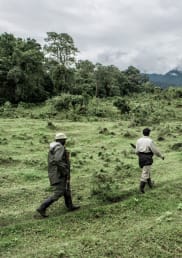ARMM youth widen support for the BOL; No votes gain ground in Isabela and Cotabato cities – Alert survey
Quezon City, Philippines: A majority of the youth in the Autonomous Region in Muslim Mindanao will vote ‘yes’ to the ratification of the Bangsamoro Organic Law (BOL), according to a survey released by peacebuilding NGO International Alert in the Philippines.

The survey showed that 70% of young people aged 18 to 35 in the ARMM are in favour of the measure, compared to 60.4% in their earlier survey released in December last year.
However, there was a dramatic increase in ‘No’ votes in the highly-contested cities of Cotabato and Isabela. From 13% in the previous survey, the ‘No’ votes are now at 32% in Cotabato City. In Isabela, from the previous 8.8%, the ‘No’ votes have risen to 35%.
“This data on youth preference is important because intention to vote is fluid. Even those who declared they will not go to the polls may change their mind before the plebiscite,” Nikki de la Rosa, International Alert Philippines country manager said.
De la Rosa reported that voter turnout among the youth, i.e. those that intend to vote, rose from 54.5% in October to November 2018 to 77% in January 2019. She cited an increase in youth familiarity of the BOL – from 84% before the campaign period to 93.5% in 2019 – as one of the reasons for the possible increase in voter turnout, and an increase in support for the measure.
Drivers of the BOL
The survey showed that the rise in the percentage of those who are in favour was most dramatic in Tawi-Tawi. Last year, only 46.2% of the youth in the province were in favour of the BOL, in contrast to 82.2% this year.
Results were similar for most of the region. The percentage of youth in favour of the BOL rose from 89.9% in 2018 to 100% in 2019 in Lanao del Sur, 80% to 88.5% in Maguindanao, and 40.9% to 51.2% in Basilan.
Sulu as outlier
In the previous study, Alert noted Sulu as distinct from the other areas in terms of the higher proportion of youth voting ‘No’ to the BOL.
“The Sulu youth are outliers, as the ‘No’ vote remains resilient, and in fact widened from 17.5% in 2018 to 25.6% in 2019,” De la Rosa said.
Polarisation
Alert’s survey shows that the youth were polarised in the belief that the BOL can prevent the youth from joining the rebellion or armed groups affiliated with ISIS, such as the Abu Sayyaf Group and the Bangsamoro Islamic Freedom Fighters. The youth respondents showed high disagreement that the BOL will benefit non-Muslims.
According to Alert statistician Angelo Casalan, the rise of ‘No’ votes in Cotabato City is due to the influx of non-Muslim youth voters declaring that they will not support the measure.
This loss of confidence in the BOL may have been heightened after the New Year’s Eve bombing outside a department store in the city that claimed two lives and injured 34, Casalan said.
The survey shows that the youth still agreed that poverty, terrorism and corruption are the main concerns that the BOL needs to address.
“Whether or not the BOL wins in this plebiscite, more work needs to be done in engaging the youth and convincing them, especially those who remain against the BOL, of their role in making the law work in their favour and work for the Bangsamoro people,” de la Rosa said.
The survey of a random sample of 328 youth respondents was held from January 11 to 13 in the ARMM, Cotabato City, and Isabela City.



